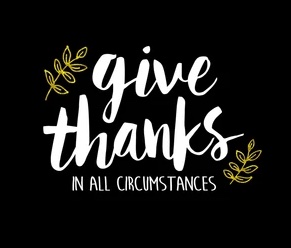Jay Blogs – Give Thanks in All Circumstances

I’ve come to a harsh and stark realization about myself this year. Growing up in this country with all its material blessings has molded, shaped and formed me more than I like to admit as the leader and pastor of this school. I have discovered that to some degree, I have been living as a functional heretic. Although I would deny up and down that the prosperity gospel is a pernicious lie, that we are saved by the blood of Jesus, and that God’s goodness and blessings, the abundant life that Jesus promises, does not by definition include material riches, robust health, and objectively “good things”, I have lived functionally and subconsciously as if I believed these things were true.
I believed my children were capable of suffering, just not real suffering: a flat tire, a bad day, a horrible grade on a test, people being mean to them, sure, but real pain and anguish? I never really envisioned that for them. They loved Jesus, after all. I believed that bad things would happen to those I love, but only as a catalyst for God to work. When things seemed at their worst, that’s when God would swoop in, perform the miraculous work in my loved ones’ lives, get the glory for the healing, and prove, once again, that He is God over all.
Somehow, despite condemning the prosperity gospel, I believed that, while perhaps I was not entitled to prosperity, a type of favored status was not too much to ask. After all, I had led this school for 20 years, through strategic planning, and culture change, and COVID, pastored and prayed for people, endured much over the years as I fought hard and did God’s will and worked to accomplish his mission. Certainly, the inner recesses of my mind told me, that would be good for something, right? Maybe a little extra protection from the pain of this world? I never would have voiced that, but I’m sure I thought it. How about you?
I think our unwitting ties to the prosperity gospel are really just about the ancient struggle we’ve all faced with the true gospel, the gospel of grace, over the millennia- it’s about our struggle with self-righteousness, the thought that somehow we can earn a better life, if we just live well enough, or do enough for Jesus. We’re all the elder son in the parable of the prodigal son–maybe not demanding, but certainly at least halfway expecting, our Father will give us what we consider “good” things if we are “good” boys and girls.
This year, nearly past, has gone a long way to stripping me of these foolish, yet doggedly-resilient notions. I’ve mourned and grieved along with you as we’ve lost so many people, including members of our school family. One of those deaths in particular struck me deeply: a close friend, a former school board member, and a senior pastor of a local church, who took his life.
His wife asked me to give the message at his graveside burial and memorial service. Trying to bring words of meaning, hope, and healing to our school community, his church body, and the broader Tyler community was one of the hardest things I’ve ever done. Coming at the end of the school year, a season when (as we can all attest) my tank was nearly empty anyway, I was at the end of all I had. I wept the Sunday before his funeral, and cried out to the Lord. If not for God’s grace through prayers from my pastor and one of my best friends, I would not have been able to speak. By his grace, God gave me words for that day.
In the months that followed, his wife graciously invited me more deeply into his story. One of the reasons he and I were friends is that we were kindred spirits- past wounds redeemed by a loving, dying God. But, were those wounds ever truly healed?
I’m not going to go into detail about his story, because that’s his family’s story to tell, other than to say that he and I shared a struggle with anger, rooted in our past. I understood, because for years I struggled with anger like that. Like my friend, I was good at hiding it. It threatened to consume me at points in my life, as well.
For years, I’ve asked the Lord to reveal the fear at root at the anger in my own life, and done deep work into the divorce, discord, and dysfunction in my formative years that gave rise to those issues. I’ve sought help, asked God to heal me, and spent hours and hours in solitude and silence being transformed by the Holy Spirit.
There’s no answer to why I’m still here and my friend isn’t, but I feel his loss deeply. That sense of loss provides a daily opportunity to be grateful for God’s grace and goodness, and a renewed appreciation and passion to help our brothers and sisters in ministry and leadership and our students who deal with pain and hurt every single day. I’m inspired to help them press into and know Jesus humbly, the God who wants to heal us. These realizations were a great opportunity to bring healing from pain, a great gift from the Lord this year.
In March, one of my daughters was in a rollover car accident. Her car was destroyed, and were afraid, at first, we had lost her. She appeared to be relatively unscathed at first, but over the past several months, she has experienced symptoms from the accident that have become debilitating. This has set us on a path that has led to seven months of doctors and health care providers, trying to get her well.
This is not what we had planned for our child, and while I remain faithful that the Lord will heal her, I’m reminded of C.S. Lewis’ words as he struggled through the illness of his wife, Joy Davidman: “We know that God is good, but we have not yet learned fully how painful that goodness will be.” That goodness is manifest in my sweet girl who knows and loves Jesus, pressing into him through her storm with a heart that was grown and cultivated at our school, and who holds onto him like Jacob at Jabbok, refusing to let go. Her struggles have been an opportunity to watch God gloriously at work in the heart of my beautiful child. She inspires and teaches me. Her faith in the midst of her suffering is a great gift to me.
Over the past year I’ve watched my father fade, Alzheimer’s taking him slowly from us. I’ve heard the disease called “the slow goodbye,” and I know why- bit by bit, he’s a little less than the day before. At this point, carrying on a coherent conversation with him is really quite impossible, as I sit and have the same disjointed conversations over and over again. And yet, he loves to sing, and it’s amazingly beautiful to me that a man who I’m sure has to be coached by his wife on my name just before he opens the door to greet me remembers every single word to Barbara Streisand’s “The Way We Were,” or Buddy Holly’s, “That’ll Be the Day,” or Simon and Garfunkel’s “Bridge Over Troubled Water,” or even more beautifully, John Newton’s “Amazing Grace.” Experts say that music is stored in a different, more resilient part of the brain than other memories, and that may be true, but I believe it is so because music is the language of Heaven, the native tongue of our Creator and His creation, and the greatest blessing to me is that the last comprehensible words on His lips are songs of joy and praise.
In I Thessalonians 5: 16-18, Paul exhorts the church to “Rejoice always, pray without ceasing, give thanks in all circumstances; for this is the will of God in Christ Jesus for you.” Paul doesn’t say “give thanks for all circumstances,” but in them, cultivating a heart of gratitude regardless of what life brings. I’ve said before that gratitude is the gateway to holiness, because cultivating gratitude is a spiritual discipline that inclines your heart toward the goodness of God, seeing Him at work in all things.
There is a prayer of St. Augustine from the fourth century, from which the Anglican evening prayer of Compline was rendered, that goes like this:
Watch, O Lord, with those who wait, or watch, or weep tonight, and give Your angels and saints charge over those who sleep.
Tend Your sick ones, O Lord Christ.
Rest Your weary ones.
Bless Your dying ones.
Soothe Your suffering ones.
Pity Your afflicted ones.
Shield Your joyous ones, and all for Your love’s sake. Amen.
There is a special blessing with grief, a special gift. Tish Harrison Warren, in her book, “Prayer in the Night,” about the Compline, says, “Unless we make space for grief, we cannot know the depths of the love of God, the healing God wrings from pain, the way grieving yields wisdom, comfort, and even joy.”
We’re entering a season of Thanksgiving, an opportunity to give praise to the One “in whom we live and move and have our being.” His blessings come in so many shapes and variants: in radiant sunlight, and glorious providences, and severe mercies that drive us, quivering, to our knees. As I have wept over my friend this year, waited for God’s healing over my child, and watched for God to bring ultimate healing to my father. Like Eustace the dragon in C.S. Lewis’ Voyage of the Dawn Treader, Aslan has used the challenges of this year to painfully peel the scales of self-reliance and unwitting entitlement and unreasonable expectations from my body, which I was unable to do myself. He has thrown me back into the pool of His beautiful, redeeming grace, to show me the depths of his love, bringing me new wisdom, comfort and joy, and once again healing me into his Beloved boy, falling in His arms and trusting only in him.
What of you? What are the beautiful, terrible, joyful, and painful ways the Lord has deeply blessed you this year? How can you use this season He’s given us to reflect deeply on His goodness in your life, and to let that gratitude lead you to deeper levels of love and holiness, as it always does?
Jay Ferguson, Ph.D., Head of School at Grace Community School, writes regularly on his blog, JaysBlog.org.
